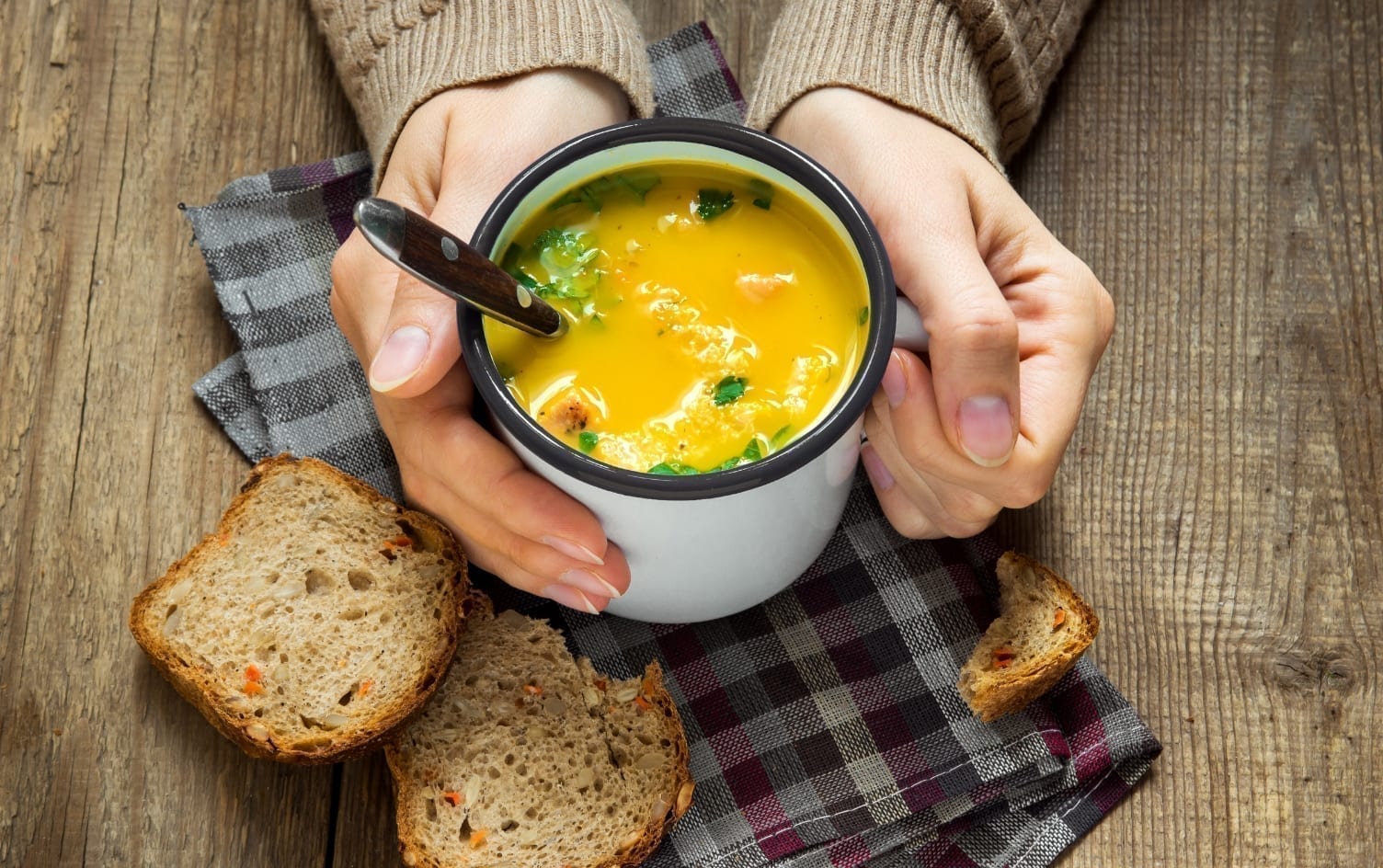If you’ve ever paid close attention to your eating habits — by keeping a food log, tracking macros, following a meal plan, etc.— you may have noticed that during the colder months you’re hungrier. It’s not just your imagination. Here, a look at the science behind why you crave warming comfort foods more during the winter — and how you can prevent overeating and weight gain when it’s cold out.
STUDIES SHOW WE EAT MORE WHEN IT’S COLD
While more research is needed on how and why weather affects our eating habits, studies have found a correlation between colder weather and increased calorie consumption. A 2005 study published in the European Journal of Clinical Nutrition found study participants consumed an average of 86 calories more each day in the fall than in the spring. Another study in the European Journal of Epidemiology similarly found people consumed more calories in colder months and felt hungrier even though they were eating larger meals. Researchers chalk this up to both colder temperatures and changing circadian rhythms.
DO YOU NEED MORE CALORIES IN WINTER?
Even when we are exposed to colder temperatures and we burn calories through shivering or nonshivering thermogenesis (that is, our body keeping itself warm in ways other than shivering), most experts agree these calories are insignificant. Thus, you don’t need to alter your calorie goal depending on the season.
HIGH-PROTEIN AND HIGH-FIBER FOODS ARE BETTER
“It’s normal to crave warm, flavorful foods in winter months,” says Chelsey Amer, RD, owner of Chelsey Amer Nutrition. She recommends trading traditional high-carb, high-fat winter comfort foods for ones that are higher in protein and fiber. Both of these nutrients help us feel satisfied after eating, which can keep hunger at bay longer. Amer recommends a hearty chili, made with plenty of beans for plant-based protein and fiber, plus some lean protein like ground turkey or beef.
It’s also natural to reach for more carb-heavy foods in the winter, since carbs give us an energy boost and can help combat that sluggish winter feeling. Amer says it’s totally fine to feed a carb craving but recommends doing so with whole grains. At breakfast, make pancakes or waffles with whole-wheat flour, cook a bowl of oatmeal and top it with fruit and nuts or eat your eggs with a side of whole-grain toast. She also recommends potatoes and sweet potatoes, which feel indulgent but are packed with fiber and nutrients.
Also, don’t discount pasta as a delicious but healthy option. For example, nutritionist Bonnie Taub-Dix, RD, uses whole-wheat pasta in both stovetop and baked pasta recipes, opts for tomato-based sauce over cream sauce and always adds extra vegetables. Using high-protein pasta like chickpea-based Banza or lentil-based Explore Foods penne is another way to get extra fiber and protein while still feeding a comfort food craving.
SNEAK IN AS MANY VEGGIES AS POSSIBLE
By adding more vegetables to your diet, you can eat more foods to satisfy your hunger pangs without going overboard on calories. Taub-Dix suggests focusing on vegetable-based soups and stews, which have similar ingredient lists to salads but feel more comforting.
“It’s always a good idea to get variety with fruits and veggies,” Taub-Dix adds. “Different colors give you different nutrients,” which not only help satisfy you, but also keep your immune system healthy enough to fight off winter colds.
Soups and stews aren’t the only dishes you can bulk up with vegetables. “When I’m craving comfort food in the winter, I do my best to make the meal a little healthier by including lots of veggies,” says Kelli Shallal, RD and certified personal trainer. “If I’m craving a warm baked potato I make sure to have a big side of roasted veggies — the oven’s already on, so just throw some veggies in with it. It’s all about balancing your meals, not cutting foods out.”
THE BOTTOM LINE
As long as you’re eating a balanced diet and making healthy choices most of the time, don’t stress too much about winter weight gain. “Eating should never be a source of stress, and you never need to skip your favorite foods,” says Taub-Dix. Ignoring your hunger or trying to avoid the foods you love can actually lead to overeating and weight gain, she says. If you’re eating appropriate portion sizes, making time for exercise and sticking to the advice above, it’s unlikely you’ll gain weight in the winter, even if it seems like you’re hungrier.




